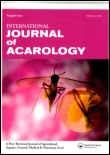
INTERNATIONAL JOURNAL OF ACAROLOGY
Scope & Guideline
Exploring Ecological and Economic Impacts of Acari
Introduction
Aims and Scopes
- Taxonomy and Systematics:
The journal emphasizes the identification, classification, and systematics of various mite taxa, contributing to the understanding of biodiversity and evolutionary relationships among mites. - Ecological Interactions:
Research addressing the ecological roles of mites in different ecosystems, including their interactions with plants, other arthropods, and microorganisms, is a core focus. - Pest Management and Control:
The journal publishes studies on the management of mite pests, exploring biological control, chemical control, and the efficacy of natural and synthetic acaricides. - Genetic and Molecular Studies:
Molecular techniques are increasingly used to study genetic diversity, population structure, and evolutionary biology of mites, providing insights into their adaptive mechanisms. - Physiological and Behavioral Studies:
Research on the physiological processes and behaviors of mites, including feeding, reproduction, and responses to environmental factors, is key to understanding their life history.
Trending and Emerging
- Molecular Genetics and Genomics:
There is a growing emphasis on molecular genetics and genomics, including studies on mitochondrial genomes and genetic diversity, to understand evolutionary relationships and mechanisms of resistance. - Eco-Friendly Pest Management Practices:
Research on the efficacy of botanical extracts and essential oils as acaricides is gaining traction, highlighting a trend towards sustainable and environmentally friendly pest management strategies. - Climate Change Impact Studies:
Increasing attention is being given to how climate change affects mite populations, distribution, and interactions with hosts, reflecting broader ecological concerns. - Biological Control Agents:
The exploration of predatory mites and entomopathogenic fungi as biological control agents against pest mites is on the rise, indicating a shift towards integrated pest management. - Behavioral Ecology:
Emerging studies focus on the behavioral ecology of mites, including predation, host interactions, and responses to environmental stressors, enhancing the understanding of their roles in ecosystems.
Declining or Waning
- Traditional Chemical Control Methods:
There is a noticeable decrease in studies focusing solely on traditional chemical acaricides, likely due to the increasing interest in integrated pest management and eco-friendly alternatives. - Broad Taxonomic Surveys:
While taxonomic contributions remain important, the breadth of general surveys across diverse regions appears to be waning, with a shift towards more targeted studies involving specific genera or species. - Basic Morphological Studies:
The focus on basic morphological descriptions of mites has diminished in favor of more detailed genetic and molecular studies, reflecting a shift in methodological approaches within the field.
Similar Journals

Egyptian Journal of Biological Pest Control
Unlocking new frontiers in sustainable agriculture.The Egyptian Journal of Biological Pest Control, published by SPRINGER, is a premier open-access journal dedicated to advancing the field of biological pest management. With its ISSN 1110-1768 and E-ISSN 2536-9342, this journal has established a reputation for disseminating high-quality research since its inception in 2008. Its commitment to open access since 2018 enhances its accessibility, making vital research available to a global audience. The journal boasts impressive Scopus rankings, including a Q1 classification in Agronomy and Crop Science and Insect Science for 2023, demonstrating its significant influence in the realms of ecological and agricultural research. The journal serves as an essential platform for researchers, professionals, and students interested in sustainable pest control strategies, focusing on the integration of biological methods within conventional agricultural practices. Based in Egypt, it plays a crucial role in addressing both regional and global challenges in pest management, affirming its importance in the scientific community.

EXPERIMENTAL AND APPLIED ACAROLOGY
Bridging Experimental Science and Practical AcarologyEXPERIMENTAL AND APPLIED ACAROLOGY is a leading international journal that serves as a premier platform for the dissemination of cutting-edge research in the fields of Ecology, Insect Science, and Medical applications related to acarology. Published by Springer, this esteemed journal has been pivotal in advancing our understanding of mite-related science since its inception in 1985, and it anticipates continued publication until 2024. With an impressive ranking in the Q2 quartile across multiple categories, including Ecology (Rank #154/461) and Insect Science (Rank #42/181), it firmly establishes itself as a significant contributor to the scientific community. Although not an Open Access journal, its rigorous peer-review process ensures high-quality publication standards, appealing to researchers, professionals, and students alike. Aiming to bridge gaps between experimental research and practical applications, EXPERIMENTAL AND APPLIED ACAROLOGY plays a crucial role in enhancing knowledge and discoveries related to acarology, highlighting its vital importance in ecology and health sciences.
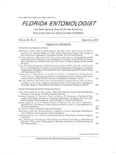
FLORIDA ENTOMOLOGIST
Illuminating the Path of Insect Science and EcologyFLORIDA ENTOMOLOGIST is a prestigious peer-reviewed journal dedicated to the advancement of entomological sciences, published by Walter de Gruyter GmbH. Since its transition to open access in 1994, the journal has become a vital resource for researchers, students, and professionals in the fields of Insect Science and Ecology, Evolution, Behavior, and Systematics. With an impact factor ranking high in its category—Q2 in Insect Science and Q3 in Ecology, Evolution, Behavior and Systematics—the journal showcases significant findings and contributions that shape our understanding of insect biology and its implications for ecological systems. The journal is indexed in Scopus, further establishing its relevance, with current rankings reflecting its competitive standing within Agricultural and Biological Sciences. Published continuously since 1982, FLORIDA ENTOMOLOGIST not only facilitates the dissemination of knowledge among entomologists but also encourages interdisciplinary collaboration, making it an essential publication for anyone invested in the scientific study of insects.
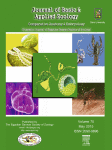
Journal of Basic and Applied Zoology
Championing high-quality research in zoological sciences.Journal of Basic and Applied Zoology, published by SPRINGER, is a premier open-access journal dedicated to the dissemination of cutting-edge research in the fields of zoology, from fundamental biological processes to applied ecological studies. Since its transition to open access in 2012, the journal has been committed to providing a platform for researchers and professionals to share their insights and discoveries with a global audience, fostering collaboration and innovation within the zoological sciences. With its ISSN 2090-9896 and E-ISSN 2090-990X, the journal prioritizes high-quality research articles, reviews, and case studies that address critical issues in animal biology and conservation. Situated at ONE NEW YORK PLAZA, SUITE 4600, NEW YORK, NY 10004, UNITED STATES, the journal plays a vital role in advancing knowledge and understanding in zoology, making it an essential resource for students, researchers, and industry professionals alike.

PHYTOPARASITICA
Advancing the Frontiers of Plant and Insect Science.PHYTOPARASITICA, published by SPRINGER in the Netherlands, is a distinguished journal dedicated to the fields of Insect Science and Plant Science. With an impressive convergence of research from 1973 to 2024, the journal holds a notable position in academic circles, ranking in Q2 for both categories as of 2023, according to Scopus metrics. This places PHYTOPARASITICA within the top 67th percentile for Insect Science and the 59th percentile for Plant Science, reflecting its significant impact on research and advancements in these crucial fields. The journal is committed to disseminating high-quality, peer-reviewed research that addresses the interplay between plants and their parasitic organisms, contributing to the broader understanding of agricultural sustainability and ecological balance. Researchers, professionals, and students will find this journal an essential resource for cutting-edge insights and developments within its domain.
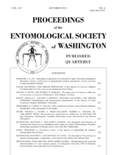
PROCEEDINGS OF THE ENTOMOLOGICAL SOCIETY OF WASHINGTON
Advancing the Frontiers of Insect ScienceProceedings of the Entomological Society of Washington is a distinguished journal dedicated to the field of entomology, published by the Entomological Society of Washington. With a rich history dating back to 1981 and a commitment to fostering scientific discourse, this journal serves as a vital platform for researchers and professionals specializing in insect science and ecology. It holds a respectable<> impact factor and is categorized in the Q3 quartile in both Ecology, Evolution, Behavior and Systematics and Insect Science, indicating its relevance within the scientific community. Although it does not offer open access, it provides a curated selection of high-quality research articles that significantly contribute to the understanding of insect biology, behavior, and taxonomy. The journal aims to bridge gaps in current research and inspire innovations in entomological studies, making it an essential resource for students, researchers, and practitioners in the field.
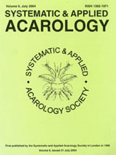
SYSTEMATIC AND APPLIED ACAROLOGY
Leading the way in acarological research and knowledge sharing.Systematic and Applied Acarology, with ISSN 1362-1971 and E-ISSN 2056-6069, is a leading international journal published by the Systematic & Applied Acarology Society in association with the esteemed Natural History Museum, London. This journal offers a vital platform for researchers in the fields of acarology, ecology, insect science, and evolutionary biology, boasting an impressive impact factor reflecting its significance, particularly with a Q1 ranking in Insect Science and Q2 rankings in Ecology and Evolution, Behavior and Systematics. The open access model ensures that groundbreaking research is readily accessible to a global audience, enhancing collaboration and knowledge sharing. With a scope that encompasses innovative studies, systematic methodologies, and applied acarology research, Systematic and Applied Acarology is committed to advancing the understanding of mite and tick biology, ecology, and their interactions within ecosystems. The journal continues to thrive as an essential resource for students, professionals, and researchers keen on pioneering studies in acarology, making impactful contributions to the scientific community.

REVISTA DE LA SOCIEDAD ENTOMOLOGICA ARGENTINA
Innovating Research for a Sustainable FutureREVISTA DE LA SOCIEDAD ENTOMOLOGICA ARGENTINA is an esteemed open-access journal dedicated to the field of entomology, published by the SOCIEDAD ENTOMOLOGICA ARGENTINA. Since its transition to open access in 2013, the journal has sought to promote research in insect science, ecology, and related disciplines, facilitating global dissemination of knowledge and encouraging collaborative studies across borders. Located in the vibrant scientific landscape of La Plata, Argentina, the journal is indexed in Scopus and categorized in the fourth quartile of ecology and insect science, reflecting its commitment to enhancing the discourse within these critical fields. Aiming to bridge the gap between researchers, students, and professionals, REVISTA DE LA SOCIEDAD ENTOMOLOGICA ARGENTINA serves as a platform for innovative research, reviews, and reports on ecological interactions, behavior, and systematic entomology, ultimately driving forward our understanding of insect biodiversity and its broader environmental impacts.
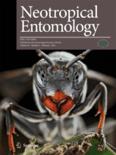
NEOTROPICAL ENTOMOLOGY
Advancing Insect Science in the TropicsNEOTROPICAL ENTOMOLOGY, published by the Entomological Society of Brazil, is a leading journal in the field of Insect Science, recognized for its significant contributions to the understanding of entomological research within the Neotropical region. With an impact factor placing it in the Q2 category and ranked #52 out of 181 in the Scopus rankings for Agricultural and Biological Sciences, this journal provides a vital platform for both seasoned researchers and emerging scholars to publish their innovative findings. Covering a broad scope of topics related to entomology, NEOTROPICAL ENTOMOLOGY aims to highlight the unique biodiversity and ecological significance of insects, fostering further appreciation and study within this crucial area of life sciences. The journal is available in both print (ISSN: 1519-566X) and online (E-ISSN: 1678-8052), ensuring accessibility to a wide audience and enhancing the dissemination of knowledge. As it converges towards its 2024 volume, the journal remains committed to advancing the scientific understanding of insect life in the tropics, making it an essential resource for researchers, professionals, and students alike.

BULLETIN OF INSECTOLOGY
Advancing Insect Science for a Sustainable FutureBULLETIN OF INSECTOLOGY is a prominent academic journal published by ALMA MATER STUDIORUM, UNIV BOLOGNA, Italy, specializing in the field of Insect Science. The journal, with ISSN 1721-8861 and E-ISSN 2283-0332, has established itself as a vital resource for researchers and professionals interested in the diverse aspects of entomology and its applications. It ranks in the Q2 category for Insect Science as of 2023, placing it among the top journals in its field with a Scopus rank of 79 out of 181. The BULLETIN OF INSECTOLOGY is committed to disseminating high-quality research and innovative studies, facilitating open dialogue and collaboration among scientists. As an essential platform for sharing groundbreaking findings, it contributes significantly to the body of knowledge in agricultural and biological sciences, making it an invaluable asset for scholars and practitioners alike. With coverage from 2002 to 2024, this journal continues to foster advancements in entomological research and its importance in tackling environmental challenges.